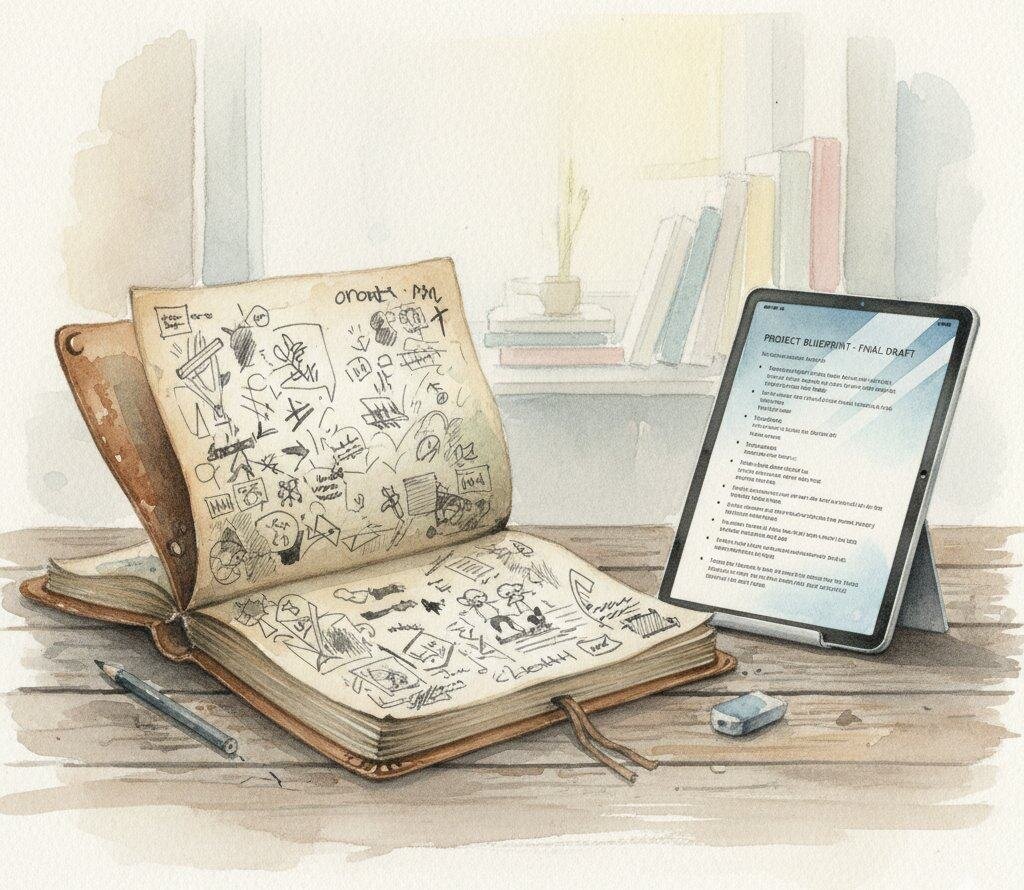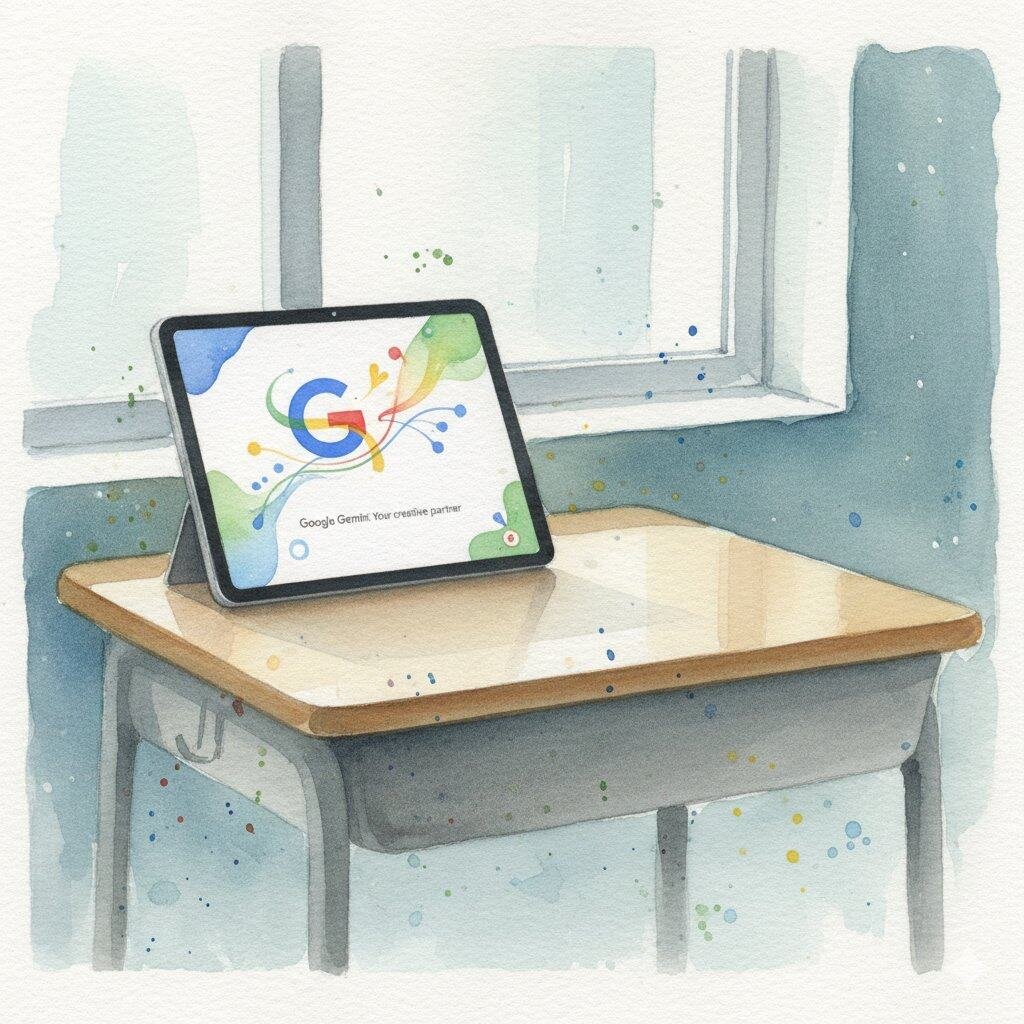Using AI for writing feels risky when authenticity matters. Here is my honest year-long journey with AI writing tools: how I learned to use AI as an editor rather than an author, what boundaries keep my voice intact, and how these tools create space for meaning instead of just more content. If you’re curious about using AI for writing but worried about losing yourself in the process, here’s what I’ve learned about staying authentic while letting technology help.
Using AI for Writing: My Year of Learning What Works
Table of Contents
The AI Companion I Never Asked For
About a year or so ago, things got overwhelming. My mind was messy, I was exhausted, and I honestly couldn’t face the administrative side of my life. That’s when I leaned hard into AI.
I’m talking about Grok, Claude, and Gemini. They became the tools that helped me think through things, express myself more clearly, and create something useful for others getting over their own hurdles. Not a replacement for human connection, of course, but a digital collaborator who was always there, ready to help me express the mix of feelings I was dealing with.
This is a real truth about using AI for a blogger like me. It’s not just about efficiency; it’s about making space for meaning.
Have you ever been so excited about a new solution that you overlooked the details?
When Excitement Makes You Skip the Important Stuff
You know that feeling when you discover something that seems like it’ll solve everything? That rush of possibility where you just want to dive in immediately?
When I first discovered AI, I was so excited I made a rookie mistake with Grok. I let it imagine my voice based on my blog name, OldDogZeroTricks, instead of actually teaching it who I am. The results sounded nothing like me. Polished, I guess. But completely inauthentic. It sounded like every other supportive-but-generic blog post on the internet, not the person I really am.
That taught me everything about prompts, those instructions you give to AI: garbage in, garbage out. But more importantly, it taught me that excitement can make you skip the important stuff, like making sure your true voice and message stay intact. You can’t passionately blog if you end up sounding like a completely different person in your writing. Which is why I eventually decided to tell AI everything; my whole blog history, my complete journey, all of it.
My AI-rookie mistake taught me something I’ve been learning my whole life but sometimes forget: my tendency to fall in line, please people, rush to create something, anything, instead of trusting my instincts and expressing what’s authentic to me, which I end up having to come back to and change.
When something promises to make things easier, we sometimes skip the part where we ask, “Does this honor who I really am?” For me, no doubt this is partly due to being unashamedly passionate about computers, while equally being addicted to hope and wanting to evolve.
Your situation might be different. Maybe it’s the diet plan you dove into without checking if it fits your life, or the productivity system you adopted without asking if it serves your real priorities. The question is the same: When you adopt new tools, are you adapting them to serve you, or are you adapting yourself to serve them?
What part of your work would you never outsource?
Protecting What Matters: Editor, Not Author
Here’s the biggest concern with AI that nobody talks about enough: it’s not that it’s too complicated; it’s that it might be too easy. Easy enough that you could let it replace the parts of your work or creativity that actually matter.
For my blog, this is the core priority. I write about life’s challenges; loss, aging, and finding meaning in transitions. I use AI to help me structure posts, refine my language, and check if my ideas are clear. But I learned early on that if I let AI draft something from scratch, it sounds like every other blogger on the internet. It lacks authenticity and loses the rough edges that come with actually sharing real, vulnerable, and sometimes genuinely embarrassing (my bad) hard-won experiences.

So, here is the strict boundary I set: AI is my editor, not my author.
For writing, my test is simple: Does this still feel like something that will comfort and support a reader going through a difficult transition? If AI makes my writing cleaner but less warm, I’ve failed.
You need your own test.
Maybe you’re experiencing this in different ways. If you use AI to draft work emails, do they still sound like you? If you use it for creative projects, does the finished work reflect your actual vision? If you use it to help with parenting challenges or personal decisions, are you getting clarity on what you think, or are you unknowingly trying to satisfy the AI?
What part of what you do would you never want AI to touch?
Here’s what I’ve learned works for me: I write my raw thoughts first, usually in a simple text file. In no particular order, just a busy stream of daily thoughts, events, random observations, emotions, and everything good and bad that is coming to mind. It can literally take a couple of hours, although it’s actually rather therapeutic. All of this mental rambling is the honest feeling behind the post. Then I bring AI in to help me organize and refine my thoughts.
An example of this (other than the many text files on my desktop) is the update edit on my Secretly Want a Makeover post, where I came home and had to write my thoughts down to document them. I don’t mind highlighting my awkwardness if it helps others to feel more comfortable in their own.
As I said, AI is my editor, not my author. It helps me say what I mean more clearly, but it doesn’t decide what I mean in the first place.
Again, your version might be different. Maybe you:
- Draft the email yourself, then use AI to make it more professional
- Create the art, music, or writing first, then use AI to help with technical refinement
- Think through the parenting challenge yourself, then use AI to suggest additional perspectives you hadn’t considered
The key is knowing which part is essentially you and protecting that part with a passion.
My test: Does this still feel like something that will comfort and support readers with their journeys?
Your test might be: Does this still serve your actual purpose? Whether that’s genuine connection, creative expression, solving real problems, or something else entirely. If the tool undermines that purpose, it’s not helping.
What’s your version of the test? What matters most about how AI works for you?
Clarity Over Emotion: The Classroom vs. The Blog
I use AI in two very different contexts, which helps me maintain perspective:
In my English classroom in Japan, AI is straightforward and practical. A student asks about the difference between similar words like “What’s the difference between ‘pot’ and ‘tub’?” I pull up Gemini, get an explanation for them in Japanese, and we move forward. It keeps the lesson flowing. There’s no emotional weight to it, no concern about authenticity. It’s just a tool for accuracy and efficiency.

My students are often impressed that the AI understands my voice so immediately. Their results in Japanese and English sometimes vary. At 57, I’m happy to be the older teacher who embraces technology effectively in the classroom. It answers questions quickly and keeps things moving.
For my blog, it’s completely different. Here, AI requires constant supervision and correction. I spend a long time discussing posts with Claude and Gemini, re-editing, making sure the language sounds like me. It’s a team effort by the end, but I’m the one deciding what stays and what goes.
I’m not looking for efficiency either, I’m looking for connection. The writing has to feel human, vulnerable, so I can authenticate the feelings I live with, invite you along, and offer what I’ve learned or am learning (if anything) along the way. And if a post doesn’t give readers that sense of “someone understands what I’m going through,” then it doesn’t matter how well-written it is.
I’ve learned the simple stuff can be outsourced entirely. For me, that’s generating SEO descriptions and even producing images. Gemini is great at image creation, although I do use Adobe Stock Images, too, for this blog. The complex stuff though, the personal, creative, and values-driven work, requires me to always keep a hand on the wheel.
Are you using AI to create space, or just to do more?
The Honest Answer About Balance
This post is filed under the Balance category, so I need to be truthful about one thing: AI hasn’t really given me less screen time. It’s actually sucked me in deeper.
I’m a lifelong computer person. I’ve been sitting at this desk for twenty years (on many days off), watching Adobe GoLive tutorials before YouTube was bought by Google, building websites, tinkering with technology. Many hours at the computer feel like a walk in the park to me. That’s where I’m comfortable.
What AI has given me is better use of that screen time.
Instead of spending an hour struggling to articulate a complex idea or manually tweaking administrative tasks, AI handles those tedious parts in minutes. That frees up my energy for the part that actually matters.. the writing that might help someone feel less alone.

These are the real benefits that AI has provided:
- More Duolingo: I’ve been able to invest extra time and focus into my language studies, allowing my mind to actively switch tracks and engage a different part of my brain, which feels like a genuine win for my mental health.
- More Reflection: The time I gain back isn’t wasted; it goes into quiet time and allows me to think about the next blog post more naturally without pressure. This helps me to cultivate my sanctuary of sorts and practice the balance I preach.
- More Peace: I actually enjoy having a to-do list waiting for me on the PC. But now, AI helps with the pleasure of whittling that list down at a satisfying pace – so it doesn’t become endless.
- Just Chilling: I’m not always about productivity or evolving. Some extra time I gain from using AI is occasionally put into a quick game of Apex Legends to unwind after a long session of writing.
Your situation is probably different
Maybe you genuinely want less screen time, and you’re hoping AI will help you accomplish your digital tasks faster so you can get outside, spend time with family, and pursue hobbies that don’t involve a computer. That’s completely valid.
Or maybe, like me, you’re comfortable with screen time and you’re just looking for that time to be more meaningful, like less administrative and more creative work. Less scrolling – more building.
Either way, be honest with yourself about what you’re actually getting. Are you using AI to create space for what matters? Or are you using it to do more of what you were already doing, just faster?
What do you do with the extra hour if you get it?
The Real Trick
The best new trick an old dog can learn isn’t about becoming good at AI. It’s about staying good at being yourself while using AI. That means using the tool to protect your most valuable, limited resource: your time for meaning.
Are you using AI to create space for what matters? Or are you using it to do more of what you were already doing, just faster? Neither answer is wrong, but knowing which one is true for you is the real trick to finding your digital balance with AI.
What’s your version of this? How are you figuring out when the AI tool helps and when it gets in the way? I’m still learning as I go, and I’m curious about how others are doing the same.

Share your thoughts below. I respond to every comment, and your experience often helps others more than mine does.





